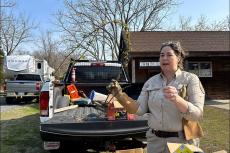New York State and New York City face "an impossible financial situation," Gov. Andrew M. Cuomo and labor leaders wrote to the state's Congressional delegation on Monday, asking for $59 billion to cover "catastrophic budget shortfalls" impacting thousands of workers.
"If we do not receive federal funding, there is no way that the state and local governments can cover the deficit," the governor said in a conference call with journalists on Monday. "There is no combination of savings, of efficiencies, of tax increases that would ever come near covering the deficit, and we need the federal government to assist in doing that, period."
If the federal government does not pass economic relief legislation, he said, it "will in effect be responsible for the consequences. And the consequences will be significant reductions across the board. It is mathematics, my friend."
"The gaps are so large," the governor said, citing $30 billion needed by the state in the current and next fiscal year "to avoid massive disruption"; $9 billion for New York City; $4.5 billion for local governments outside of New York City; $12 billion for the Metropolitan Transportation Authority, and $3 billion for the Port Authority of New York and New Jersey.
The Port Authority's projects rebuilding La Guardia and John F. Kennedy International Airports employ thousands of private sector construction workers, the letter says. "The M.T.A.'s $51 billion capital plan will be on hold, and East Side Access and a revitalized Penn Station will be lost, maybe forever. We must not lose these jobs and these projects -- they are necessary to cementing New York's economic future."
"There is no combination of state efforts that will address this financial crisis without federal assistance," the letter says. "Even if state and local governments cut expenses, increase taxes, and reduced services, the revenue shortfall would still be in the billions of dollars. Moreover, forcing state and local governments to take such actions would only further the pain and extend the period of time for the nation's economy to recover. Virtually all economists agree that forcing state and local governments to lay off employees and reduce services will negatively impact the national recovery. We saw that with the last fiscal crisis in 2007-2009, and we know that it will play out again."
"It's unclear whether the White House or Senate is willing to actually be reasonable," the governor told those on the call, "but if they're not, I want them to understand the consequences."
The letter, co-signed by the leaders of eight major labor unions, also calls on Congress to repeal "the damaging and offensive SALT tax 'reform,' " a reference to the cap imposed on taxpayers that prevents them from deducting more than $10,000 in state and local taxes from their federal income taxes. The cap was implemented as part of the Republican-led 2017 tax overhaul.
The governor also discussed the most recent statistics with respect to the coronavirus pandemic. Among 66,000 tests conducted on Sunday, .99 percent were positive for Covid-19. Four hundred and eighteen New Yorkers were hospitalized with the virus, "the lowest number hospitalized since this crisis began," he said.
One New Yorker died from Covid-19 on Sunday, the governor said, spurring lengthy remarks on the last six months. "I would like everyone to pause for a moment on that fact," he said. "One New Yorker passed away. There was a time when we were going through this when we literally had hundreds of people dying every day. I asked New Yorkers, I beseeched New Yorkers to understand the facts and to act responsibly. And I said that what the future holds is determined by what New Yorkers do. And 'flattening the curve' -- we've used that expression over and over, but flattening the curve actually saved lives."
Initial projections, he said, were for 110,000 to 140,000 New Yorkers to be hospitalized, but "we never went over 20,000 hospitalized . . . that's how significant the flattening of the curve was, the reduction of viral transmission was. No expert believed we would be that successful, and I spoke to all of them." Because of their actions, "New Yorkers have saved tens of thousands of lives."
He cautioned against complacency, however, noting an uptick in infections and hospitalizations in Western New York. "We're going to continue testing," he said, "but we need increased compliance, and we need local governments to respond in western New York."




